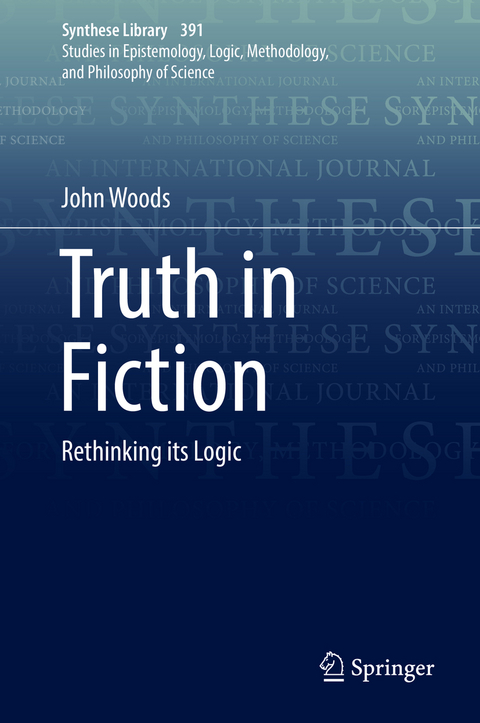
Truth in Fiction
Springer International Publishing (Verlag)
978-3-319-72657-1 (ISBN)
This monograph examines truth in fiction by applying the techniques of a naturalized logic of human cognitive practices. The author structures his project around two focal questions. What would it take to write a book about truth in literary discourse with reasonable promise of getting it right? What would it take to write a book about truth in fiction as true to the facts of lived literary experience as objectivity allows?
It is argued that the most semantically distinctive feature of the sentences of fiction is that they areunambiguously true and false together. It is true that Sherlock Holmes lived at 221B Baker Street and also concurrently false that he did. A second distinctive feature of fiction is that the reader at large knows of this inconsistency and isn't in the least cognitively molested by it. Why, it is asked, would this be so? What would explain it?
Two answers are developed. According to the no-contradiction thesis, the semantically tangled sentences of fiction are indeed logically inconsistent but not logically contradictory. According to the no-bother thesis, if the inconsistencies of fiction were contradictory, a properly contrived logic for the rational management of inconsistency would explain why readers at large are not thrown off cognitive stride by their embrace of those contradictions. As developed here, the account of fiction suggests the presence of an underlying three - or four-valued dialethic logic. The author shows this to be a mistaken impression. There are only two truth-values in his logic of fiction.
The UBC Honorary Professor of Logic and Director of The Abductive Systems Group. Fellow of the Royal Society of Canada. Author of The Logic of Fiction (1974), Fallacies: Selected Papers 1972-1982 (with Douglas Walton in 1989). Author of Paradox and Paraconsistency (2003) and, with Dov Gabbay, of Agenda Relevance (2003) and The Reach of Abduction (2005). Author of the Death of Argument (2004), Aristotle's Earlier Logic (2001), Errors of Reasoning: Naturalizing the Logic of Inference (2013) and Is Legal Reasoning Irrational? An Introduction to the Epistemology of Law (2015).
1. Misconception and Pretence.- 2. A Research Programme for Fiction.- 3. What Readers Know.- 4. Truth-Making.- 5. Sherlock.- 6. Models and Formal Representations.- 7. "Sherlock".- 8. Salty Tears and Racing Hearts.- 9. Other Things Sherlock Isn't.- 10. Putting Inconsistency to Rest.
"It is never less than a thought-provoking and enjoyable read. Anyone interested in the semantics and pragmatics of fiction will find much of value in its pages." (Andrew Aberdein, Philosophia, Vol. 49, 2021)
"The book should be read by anyone interested in philosophical issues related to literary discourse. It deserves to be widely read and discussed, for it raises important issues on reference, meaning, truth and logic in general as well as specific considerations surrounding the ontology, epistemology and semantics of fictions. And it is a pleasure to read. ... The book also has an impressive and comprehensive bibliography." (Jean-Pierre Marquis, Mathematical Reviews, October, 2020)"Woods is a very good writer, opinionated also about the words he uses: choosing, say, 'impalpable' for abstract, 'site' for world, or labels like 'no spine-no readers' views, or 'command and control epistemology'. This makes the book an enjoyable read. I unhesitatinglyrecommend it to readers interested in these topics ... ." (Manuel García-Carpintero, Notre Dame Philosophical Reviews, ndpr.nd.edu, September, 2018)
| Erscheinungsdatum | 17.03.2018 |
|---|---|
| Reihe/Serie | Synthese Library |
| Zusatzinfo | XIV, 239 p. |
| Verlagsort | Cham |
| Sprache | englisch |
| Maße | 155 x 235 mm |
| Gewicht | 549 g |
| Themenwelt | Geisteswissenschaften ► Philosophie ► Sprachphilosophie |
| Schlagworte | Alexius Meinong • Causal response epistemology • Dale Jacquette • Dom Lopes • Edmund Husserl • Fictional nonambiguity • Francesco Berto • Frege-Russell • Graham Priest • Inconsistency-management • Inconsistency of fiction • Kendall Walton • Lived readerly experience • Pretendism • Re-engagement psychology • Saul Kripke • Semantic illusion • Semantics of fictional discourse • Tarski-Quine-Davidson • Terence Parsons • Truth-making • Truth-sitedness |
| ISBN-10 | 3-319-72657-9 / 3319726579 |
| ISBN-13 | 978-3-319-72657-1 / 9783319726571 |
| Zustand | Neuware |
| Haben Sie eine Frage zum Produkt? |
aus dem Bereich


